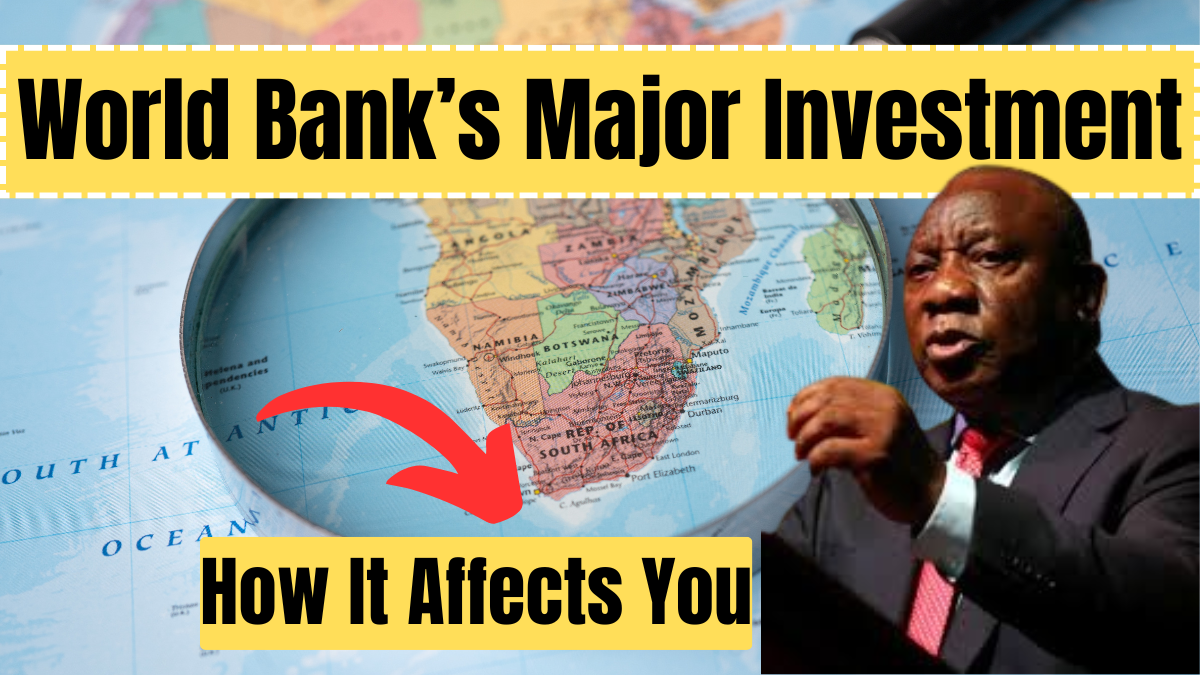The World Bank has announced a major financial investment in South Africa aimed at strengthening economic stability, energy security, and infrastructure development. This funding will play a critical role in boosting the country’s economic growth, employment opportunities, and sustainability efforts.
With a focus on key sectors like energy, education, and trade, the investment is expected to have long-term benefits for South African citizens.

Key Areas of the World Bank’s Investment in South Africa
| Sector | Investment Focus |
|---|---|
| Energy | Expansion of renewable energy projects to improve electricity access and reduce power cuts. |
| Infrastructure | Funding for transportation, roads, and urban development to support economic growth. |
| Education | Investments in schools and vocational training to enhance skills and employment opportunities. |
| Trade and Business | Supporting small businesses and exports to strengthen South Africa’s global competitiveness. |
This strategic investment will help stabilize critical industries, create new job opportunities, and improve living conditions for millions of South Africans.
How the Investment Will Impact South Africans
1. Strengthening Energy Security
South Africa has faced ongoing energy crises, including frequent power outages that disrupt daily life and economic productivity. A major portion of the World Bank’s funding will go towards expanding renewable energy projects such as solar and wind power.
What This Means for You:
- Fewer power cuts (load shedding) due to increased energy supply.
- Lower electricity costs over time as renewable energy sources expand.
- More job opportunities in the renewable energy sector.
2. Infrastructure Development for Economic Growth
A significant portion of the investment will focus on improving roads, transportation networks, and urban infrastructure. This will not only enhance connectivity but also stimulate business activity in both urban and rural areas.
What This Means for You:
- Better public transportation systems to improve mobility.
- New roads and infrastructure projects that create construction jobs.
- Boosted trade and commerce as businesses can operate more efficiently.
3. Education and Workforce Development
A well-educated and skilled workforce is essential for economic growth. The World Bank’s investment will include funding for education programs, vocational training, and skill-building initiatives.
What This Means for You:
- Improved access to quality education for students in underdeveloped regions.
- More vocational training programs to equip job seekers with in-demand skills.
- Better job placement opportunities in growing industries like technology and renewable energy.
4. Supporting Small Businesses and Trade
The World Bank’s funding will also focus on helping small and medium-sized enterprises (SMEs) thrive. This includes grants, loans, and financial support for entrepreneurs looking to expand their businesses.
What This Means for You:
- Easier access to business loans and funding for startups and small businesses.
- Stronger export markets for South African products.
- Increased investment in local businesses, leading to job creation.
Challenges and Concerns Regarding the Investment
While the World Bank’s financial support is a positive step, some challenges remain:
- Government Accountability – Ensuring that funds are used effectively and reach the intended sectors.
- Debt Concerns – The financial aid may increase South Africa’s national debt, leading to future repayment challenges.
- Implementation Delays – Large-scale infrastructure and energy projects often face delays due to bureaucratic hurdles.
However, with transparent financial management and efficient project execution, these challenges can be addressed to ensure the investment delivers tangible benefits for all South Africans.
FAQs
How much is the World Bank investing in South Africa?
The exact funding amount has not been publicly disclosed, but the investment focuses on energy, infrastructure, education, and business growth.
How will this investment help South Africans directly?
It will lead to better energy access, job creation, improved transportation, and increased support for small businesses.
Will this funding help reduce power outages in South Africa?
Yes, a large portion of the investment will go toward renewable energy projects, aiming to reduce reliance on coal and improve electricity supply stability.
When will South Africans start seeing the benefits of this investment?
Some projects, like renewable energy expansion, may take a few years to show results, but infrastructure and business development could have immediate positive impacts.
Will this investment increase taxes for South Africans?
The investment is structured as financial assistance rather than a tax-funded initiative, so it should not directly lead to increased taxation.
How will small businesses benefit from the World Bank’s support?
The investment includes financial support programs, grants, and easier loan access for entrepreneurs and SMEs to grow their businesses.
How can South Africans track the progress of these investments?
The government and World Bank will release progress reports through official websites and economic development updates.
Are there risks involved with accepting financial aid from the World Bank?
While financial aid can boost development, concerns include debt repayment obligations and project execution challenges.
Click here to know more.
Aanchal is a passionate writer with a keen interest in storytelling, content creation, and creative expression. She enjoys exploring diverse topics and crafting engaging narratives that captivate readers.